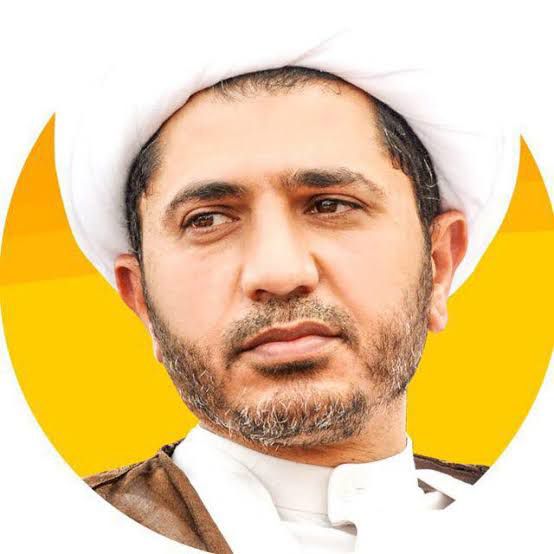Sheikh Ali Salman, head of Al-Wefaq Society, the largest opposition bloc in Bahrain, is serving a life sentence for practicing his peaceful political activism, which calls for the establishment of a democratic system, in which the citizen is an effective partner in managing the country’s affairs.
Numerous evidence confirms that Sheikh Ali Salman’s trial was marred by many serious legal and human rights violations, including the infringement of his natural right to defend himself.
On December 28, 2014, Sheikh Ali Salman was arrested, after the Bahraini government intensified its suppression of public freedoms to retaliate against its peaceful critics, manipulating unfair and restrictive laws and dismantling any hope for the Bahraini citizens to achieve democracy.
Sheikh Ali Salman has been behind bars since December 28, 2014, along with the rest of Bahrain’s top opposition figures, who are also arbitrarily serving a life sentence, incommunicado.
Indeed, the trial of Sheikh Ali Salman, likewise the trials of the other opposition prisoners of conscience and patriots, is based on fabricated charges, which are purely politically motivated.
For years, the Bahraini authorities have employéd false charges, such as plotting to topple the regime, and espionage with a foreign country, to criminalize activists and peaceful dissidents, merely for exercising their right to assembly, freedom of expression and peaceful activism.
Meanwhile, the vast majority of Bahrainis agree that Sheikh Ali Salman is a brave patriot, who endorses peace, in word and in practice as he has repeatedly called for adherence to peace in popular protests. He has, sincerely and impartially, sought to establish a democratic state, which guarantees political partnership and achieves the aspirations of all citizens, away from sectarian discrimination and political exclusion.
Despite the various meetings, which brought together Sheikh Ali Salman and diplomats of the Bahraini government’s senior allies, i.e. the United States of America and the United Kingdom, in which the discussion that took place, at the time, was improving the human rights situation in the country, and the importance of inaugurating a comprehensive national dialogue between the government and the opposition, which ought to achieve security and stability in the long run; nevertheless, both Washington and London’s efforts were disappointing and failed to go beyond the limits of expressing concern.
Unfortunately, the two allies have largely failed to exert effective pressure for the unconditional release of Sheikh Ali Salman and other prisoners of conscience, and for the abolition of arbitrary restrictions on citizens’ freedoms.
Today, 7 years after his arrest, Sheikh Ali Salman is still calling, as ever before, for a comprehensive national reconciliation that the Bahraini government has relentlessly delayed for many years.
This reconciliation is expected to satisfy all Bahrainis; maintain equal citizenship and equal rights and duties; end rampant sectarian exclusion; achieve permanent security and stability for Bahrain; and protect the country from any political turmoil in the future.
Reema Shaalan, PhD in Law, and wife of Sheikh Ali Salman


 العربية
العربية Français
Français Deutsch
Deutsch